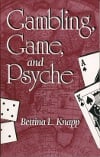

Gambling, Game, and Psyche

Bettina L. Knapp
Reviewed by Holly Sandford
- Avoid
- Browse
- Buy
- Love
- Never Play Without It
Gambling, Game, and Psyche is a scholarly work that will undoubtedly appeal to academics, gamblers, and just about anyone interested in the psychology of victory and defeat. Professor Knapp explores gambling through history by examining the works of Dostoevsky, Balzac, Poe, Zhang, Pascal, and other literary titans. Despite the sophistication of the ideas presented in Gambling, Game, and Psyche, readers don't need to be familiar with the works in question to follow Knapp's Jungian analysis.
As Bettina L. Knapp's introduction to Gambling, Game, and Psyche reveals, games of chance have been an inherent part of culture since time immemorial. However, the focus of Gambling, Game and Psyche is not only to highlight gambling’s place within society, but also to illustrate the various literary approaches that have been made. Specifically, Knapp examines the motif of the troubled gambler, found within the books of Poe, Dostoevsky, Hesse, and others.
Knapp's slim guide into the mind of literary gamblers touches on several key works, including the aforementioned Poe’s “William Wilson”, a dark tale exploring doppelgangers and Dostoevsky’s novella, The Gambler. However, more recent titles, such as Zhang Xinxin’s lesser known Orchid Madness (or Orchid Mania, depending on the translation), are also covered. Readers who perhaps aren’t familiar with the literature discussed are provided with ample information about each tale, as well as a brief biography of the author. While the aim of the book is of course to encourage new examinations of the gambler’s psyche, Knapp’s volume can be read alongside the books featured, and only a cursory knowledge of each story is required to grasp the main themes discussed in Gambling, Game, and Psyche.
It's clear throughout the book that Knapp not only has an enthusiasm for the discussion at hand, but also awareness that not everyone who is interested in literary representations of gambling will be well-versed in theory. Throughout Gambling, Game, and Psyche, readers are presented with clear-cut and illustrative examinations of the texts. Theory-phobes will be pleased to learn that the more academic sides of the arguments are also clearly explained.
It's important to note that, while Knapp draws upon each biographical details when discussing each story, the author steers clear of offering simply a psycho-biographical approach (akin to Marie Bonaparte’s study, The Life and Works of E. A. Poe) of each writer. Instead, Knapp allows the gamblers and events in stories such as “William Wilson” to speak for themselves. The result is a chapter that’s approachable, with enough academic gravitas to satisfy even the most inquisitive minds.
Bettina Knapp sadly passed away in 2010, leaving behind an exhaustive collection of academic work, ranging from studies of multicultural writers to French fairy tales. While Knapp’s contribution to literature theory will be sorely missed, we hope that other bright minds continued the path ploughed by Knapp in Gambling, Game, and Psyche.
